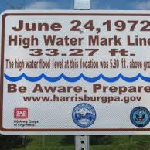 Amelia Trav Jun 17, 2014 09:13 |
Hi,
This is a very interesting proposal, and it would be great to see it developed further. In particular further details about the costing and any campaigns you would like to see designed to go with this project.
Additionally, it would be valuable to look into examples of how people respond to such markers and whether they are effective. There have been a number of examples of such sea level rise markers being put around cities, often in the form of graffiti, and backing this proposal up with evidence of effectiveness would strengthen it considerably.
The psychology of the visibility of issues is quite complex. For example, just because people see beggars daily on the street doesn't mean that they do anything to help solve the problem, often people become blind to things they see daily. Particularly if they are issues the community considers too big for them to cope with alone. This is another issue you may wish to develop within your proposal, and outline how you would overcome it.
It's an excellent start, and I wish you all the best in further development of this concept.
|
 Dan Whittet Jun 20, 2014 11:33 | Proposal contributor
Thanks for your input amaltr42, I based this idea a little bit on a project started by Rob Walker in 2009, the Hypothetical Development Organization.
http://hypotheticaldevelopment.com/
One of the aspects of this that I like is its VERY cheap to implement. If we had support from NOAA for example, who already has the statistical data, it would be more of a public service. (Why would you think of building here if you know it's going to flood?) There will be a lot of resistance, just as there was to health warnings on cigarette packages. The value of real estate in areas designated “future flood areas” would plummet, and that’s a cost that SHOULD be factored in to Climate change denial. When legislators discuss the cost of a tax on Carbon, the issue of declining property values and lost tax revenue is rarely discussed.
Another influence for this idea would be the wrapping projects of the artists Christo and Jeanne-Claude where the politics of the installation IS the event.
http://christojeanneclaude.net/projects/wrapped-reichstag#.U6RPMrTD9lc
I believe that an effort to put up future flood data signage would be so controversial that it would create debate and media coverage that would be excellent for consciousness raising. This in itself might leverage public sentiment.
|
 Dan Whittet Jun 20, 2014 02:31 | Proposal contributor
Today a series of grants were announced. As part of the Obama Administration’s commitment in the Climate Action Plan to make local communities more resilient against future storms, Secretary of the Interior Sally Jewell today announced $102.7 million in competitive matching grants to support 54 projects along the Atlantic coast. The grants will fund science-based solutions to restore wetlands and other natural areas, better manage stormwater using green infrastructure and assist states, tribes and local communities in protecting themselves from major storms such as Hurricane Sandy, which devastated much of the East Coast in 2012.
I propose that any restoration or resilliancy projects in coastal areas be required, as part of the grant, to install signage as described in this project showing scientifically determined potential flood water heights.
|
 Marina Psaros Jul 18, 2014 03:08 |
Hi have you seen Eve Mosher's very cool High Water Line? http://highwaterline.org/ Might give you inspiration to further develop this idea.
Also, the NPS has done this at Crissy Field in San Francisco: http://www.nps.gov/goga/naturescience/sea-level-rise-exhibits.htm
Good luck!
|
 Climate Colab Aug 6, 2014 12:33 |
This proposal is novel and interesting but a little unclear. How will signage be done under existing laws and practices? Are there zoning issues? Can the data on the signs and on which signage is based be accessed online/digitally to, say, map risks? Signs are mainly seen by users but not necessarily people who buy or lease property. Will this information be available to such users? This can be a very interesting project, but the proposal needs a lot of development to be implementable.
|
